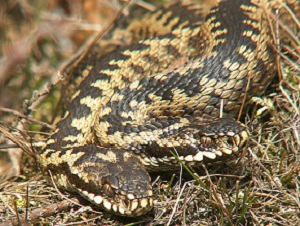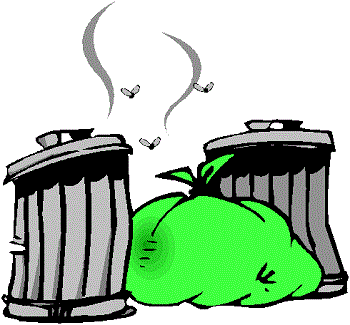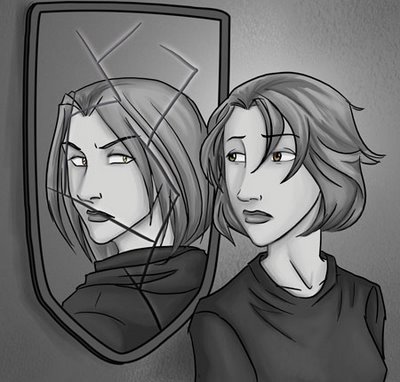Category: "Uncategorized"
Гадюка
The Russian word гадюка means 'viper' or 'adder'. It declines like so:
| Sg | Pl | |
| Nom | гадюка | гадюки |
| Acc | гадюку | гадюк |
| Gen | гадюки | гадюк |
| Pre | гадюке | гадюках |
| Dat | гадюке | гадюкам |
| Ins | гадюкой | гадюками |
There are a few species of vipers that live in Russia, not very many though. When it's starts to get really cold in Russia, the snakes start migrating indoors, especially in rural towns. Waking up to find a snake in your living room doesn't sound very fun. Warnings are usually issued during the colder parts of the year regarding snake home invasions. That's not the kind of viper I'd like to be surprised with in my driveway.

Photo Credit: Piet Spaans, CC-BY-SA-2.5, via Wikimedia Commons
Here are some example sentences:
| Не ходите туда! В унитазе гадюка! | Don't go in there! There's a viper in the toilet! |
| Меня укусила гадюка! Высоси яд! | The viper bit me! Suck out the venom! |
| Идиот! Нет гадюки в гостиной! Ты выпил, что ли? | You idiot! There's no viper in the living room! Have you been drinking or what? |
| Не волнуйтесь, это была не гадюка, a шланг просто. | Don't worry, it wasn't a viper, it was just a hose. |
Храпеть
The Russian word храпеть means 'to snore'. It conjugates like this:
| Imperfective | Perfective | |
| Infinitive | храпеть | похрапеть |
| Past | храпел храпела храпело храпели |
похрапел похрапела похрапело похрапели |
| Present | храплю храпишь храпит храпим храпите храпят |
No such thing as perfective present in Russian. |
| Future |
буду храпеть будешь храпеть будет храпеть будем храпеть будете храпеть будут храпеть |
похраплю похрапишь похрапит похрапим похрапите похрапят |
| Imperative | храпи(те) | похрапи(те) |

Here are some examples:
| Он храпел всю ночь. | He snored all night long. |
|
— Ты выглядишь ужасно. — Hу, я не мог уснуть вчера ночью. Моя жена храпелa, как порося. |
"You look terrible." "Well, I couldn't fall asleep last night. My wife was snoring like a piglet." |
| Он храпел каждую ночь, поэтому она навалилась на его и задушила подушкой. | He snored every night, so she stuffed a pillow in his face and smothered him. |
| Она громко храпит, но мне всё равно. | She snores loudly, but I don't mind. |
Мусор
The Russian word мусор is a noun that means ‘trash.’ It is a first declension noun. It is never used in the plural.
| Sg | |
| Nom | мусор |
| Acc | мусор |
| Gen | мусора |
| Pre | мусоре |
| Dat | мусору |
| Ins | мусором |

Here are some examples:
| Вынеси мусор, пожалуйста. | Take out the trash please. |
| В мусорном ящике нет мусора. | There's no trash in the trash can. |
| Брось скорлупу в мусор. | Throw the eggshells in the trash. |
Russia, like many countries, disposes of their nation's trash by means of landfills. Being that Russia makes up 1/8 of the Earth's landmass they should have no problem finding places to dispose of trash, at least that's what many people in the government and waste management industry believed. That notion came to a screeching halt once a lot of the landfills started filling up. The fact that most of these full landfills are located on the outskirts of cities and towns raised the stakes even higher. It has posed a lot of problems to both the infrastructure and the nearby residents. As the amount of trash increases, the air and soil quality surrounding the landfill decreases. This makes for very unhealthy and stinky conditions. Nobody wants to step outside their house on their way to work just to be greeted by a big whiff of last year's dinner. I'll pass on those leftovers, thank you very much. The waste management industry is working with the government to find an reasonable solution. It's a work in progress, but until it gets resolved, plug your nose.
Interestingly enough, the word «мусор» is also used as a derogatory name for policemen in Russia. It's equivalent to calling a police officer 'pig' in the United States. I do not recommend using this slang within earshot of any law enforcement officer, because it'll probably get you into a pretty nasty situation. When used in this manner the word does have a plural form: «мусора».
Here are some examples:
| Не едь по Калинина, там мусора.¹ | Don't take Kalinin Street: the pigs are there. |
| Не превышай скорость по Вишневского, а то мусора оштрафуют. | Don't speed on Vishnevsky Street, otherwise the pigs will ticket you. |
¹ The word едь is substandard Russian speech, not something that a foreigner should emulate. But if a Russian is going to be rude enough to call the police мусор, then he'll probably allow himself this kind of grammatical irregularity as well, so I think we'll keep the example as it stands.
Путешествовать
One of the Russian words that can be translated as ‘to travel’ is путешествовать. It conjugates like this:
| Imperfective | Perfective | |
| Infinitive | путешествовать | попутешествовать |
| Past | путешествовал путешествовала путешествовало путешествовали |
попутешествовал попутешествовала попутешествовало попутешествовали |
| Present | путешествую путешествуешь путешествует путешествуем путешествуете путешествуют |
No such thing as perfective present in Russian. |
| Future |
буду путешествовать будешь путешествовать будет путешествовать будем путешествовать будете путешествовать будут путешествовать |
попутешествую попутешествуешь попутешествует попутешествуем попутешествуете попутешествуют |
| Imperative | путешествуй(те) | попутешествуй(те) |
In some senses this verb is exactly like the English verb ‘to travel’:
| Моя бабушка не любит путешествовать. | My grandmother doesn't like to travel. |
| Ты часто путешествуешь? | Do you travel often? How often do you travel? |
| В прошлом году я всё лето путешествовал. | Last year I traveled the whole summer. |
| — Какие планы у тебя на лето? — Я всё лето буду путешествовать. |
“What are your plans for the summer?” “I'm going to travel all summer long.” |
One difference between this verb and the English verb ‘to travel’ is that in English we talk about traveling to a place. In Russian you can't use в + accusative or на + accusative with путешествовать. Instead you talk about traveling ‘around’ a place. In that sense we use по + dative:
| В прошлом году я путешествовал по Европе. | Last year I traveled around Europe. |
| — Какие у тебя планы на лето? — Я буду путешествовать по Норвегии. |
“What are your plans for the summer?” “I will be traveling around Norway.” |
| — Ты любишь путешествовать за границей? — Нет, больше всего я путешествую по местам, которые я уже знаю. |
“Do you like to travel abroad?” “No, I mostly like to travel around places I already know.” |
Суеверие
Суеревие is the Russian word for superstition. This word declines as such:
| Sg | Pl | |
| Nom | суеверие | суеверия |
| Acc | суеверие | суеверия |
| Gen | суеверия | суеверий |
| Pre | суеверии | суевериях |
| Dat | суеверию | суевериям |
| Ins | суеверием | суевериями |
| У него нет суеверий. | He does not have superstitions. |
| Мне не нравятся суеверия. | I don’t like superstitions. |
| Как ты справляешься с абсурдными суевериями своей мамы? | How do you deal with your mother's ridiculous superstitions? |
| Я слушала лекцию о русских суевериях. | I attended a lecture on Russian superstitions. |
A superstition is the belief in the supernatural beings or events. Most all countries have them and they are rooted into their cultures. Some of the American ones are don’t break a mirror unless you want seven years of bad luck. If a black cats crosses your path you are also going to have bad luck. We have some rhymes to help people remember them as well, such as step on a crack will break your mother’s back. Some of Russia’s superstitions are: On exam day you shouldn’t wear anything new, make your bed or cut your fingernails, a funeral procession is good luck unless you cross its path. Both the US and Russia believe that breaking a mirror is bad luck. For Russians looking into a broken mirror is also is bad luck. Nowadays superstitions are not as highly regarded but certain ones are still believed by older generations. Growing up as Christian I was taught that superstitions are fun to think about but not something to live by because the supernatural of that sort is not real or worth worry about it.
